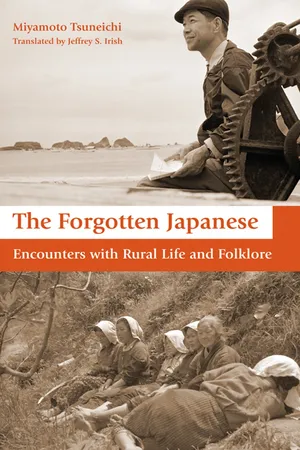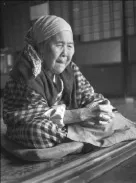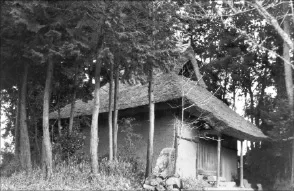
eBook - ePub
The Forgotten Japanese
Encounters with Rural Life and Folklore
- 320 pages
- English
- ePUB (mobile friendly)
- Available on iOS & Android
eBook - ePub
About this book
A groundbreaking document of rural Japanese life, stories, and traditions from 1850-1960.
Tsuneichi Miyamoto (1907-1981), a leading Japanese folklore scholar and rural advocate, walked 160, 000 kilometers to conduct interviews and capture a dying way of life. This collection of photos, vignettes, and life stories from pre- and postwar rural Japan is the first English translation of his modern Japanese classic. From blowfish to landslides, Miyamoto's stories come to life in Jeffrey Irish's fluid translation.
Frequently asked questions
Yes, you can cancel anytime from the Subscription tab in your account settings on the Perlego website. Your subscription will stay active until the end of your current billing period. Learn how to cancel your subscription.
No, books cannot be downloaded as external files, such as PDFs, for use outside of Perlego. However, you can download books within the Perlego app for offline reading on mobile or tablet. Learn more here.
Perlego offers two plans: Essential and Complete
- Essential is ideal for learners and professionals who enjoy exploring a wide range of subjects. Access the Essential Library with 800,000+ trusted titles and best-sellers across business, personal growth, and the humanities. Includes unlimited reading time and Standard Read Aloud voice.
- Complete: Perfect for advanced learners and researchers needing full, unrestricted access. Unlock 1.4M+ books across hundreds of subjects, including academic and specialized titles. The Complete Plan also includes advanced features like Premium Read Aloud and Research Assistant.
We are an online textbook subscription service, where you can get access to an entire online library for less than the price of a single book per month. With over 1 million books across 1000+ topics, we’ve got you covered! Learn more here.
Look out for the read-aloud symbol on your next book to see if you can listen to it. The read-aloud tool reads text aloud for you, highlighting the text as it is being read. You can pause it, speed it up and slow it down. Learn more here.
Yes! You can use the Perlego app on both iOS or Android devices to read anytime, anywhere — even offline. Perfect for commutes or when you’re on the go.
Please note we cannot support devices running on iOS 13 and Android 7 or earlier. Learn more about using the app.
Please note we cannot support devices running on iOS 13 and Android 7 or earlier. Learn more about using the app.
Yes, you can access The Forgotten Japanese by Tsuneichi Miyamoto,Jeffrey Irish in PDF and/or ePUB format, as well as other popular books in Social Sciences & Ethnic Studies. We have over one million books available in our catalogue for you to explore.
Information
Part One
Life Stories

An elderly woman in Aomori Prefecture, one among thousands who shared their life stories with Miyamoto. August 1966.
Chapter 1
Meetings
[Tsushima Island, Nagasaki Prefecture, July–August 1950]
The village of Ina lies on the west coast of Tsushima, near its northern end, and long ago whale was hunted there. I was in the village for three days, and early on the second I woke to the sound of a conch shell being blown. I was told that a village meeting would be held. When I went out in the morning and passed near the shrine, a large number of people were gathered in the forest there. I called on one of the village’s old families and asked them about various things. After noon, when I passed the shrine again, I saw that people were still there, talking. I wondered if they had talked on without a break for lunch and was curious to know just what they might be deliberating. Without asking, I returned to my lodging and visited the home of the village headman in the afternoon. The headman, who was still young, was away at the meeting, but an old man, his father, was at home.
In this village only the heads of rural samurai households took on the headman’s role, a position the old man had also held when he was young. The farmers had a representative as well, and together they made various decisions regarding the village.
In the course of asking the headman’s father all sorts of things, I learned that there was a register box containing the village’s records that had been passed down for many generations. When I inquired whether I might be able to see these documents, he told me they were not at his discretion to show. The box had a key that was in the possession of the headman and could only be opened in the presence of the farmers’ representative. I asked if I might be shown the contents in the presence of these two men, and the old man sent someone to the meeting to bring them back. When I explained the situation, they were happy to open the box and show me, and they did just that. I spent the entire night transcribing the main parts but, being dreadfully tired from my travels, my work was inefficient.
When morning came I went to the house of the old man and asked, “Might I borrow these old documents for a time?” The old man said we would have to ask his son. Apparently the village meeting continued on this day as well, and his son had gone off to attend. So once again the old man sent someone to bring him back. The son said that matters of this sort must be brought before the meeting and everyone’s opinion heard, so he took the parts of the old documents I wanted to borrow and, saying that he would ask everyone’s opinion, he departed. Noon came, but he had not returned. It turned three, and still he had not come back. When I asked the old man, “What on earth could they be discussing?” he said, “There are many matters to be decided . . . ”
As I had thought to go to Sago, more than seven miles to the north, that same day, I became increasingly anxious and decided that I would try going to the meeting. The old man agreed to come along with me. More than twenty people sat on the wood floor inside the meeting hall while others crouched under the trees outside, talking in small groups. They appeared to be talking idly, but this was not the case. When I asked what was going on, I was told that when something is decided in the village, they will sometimes talk for days until everyone is satisfied. After gathering and hearing an explanation from the headman, the villagers talk things over in their respective community groups and take their conclusions to the headman. If an agreement is not reached, they return to their groups and discuss the matter further. Sometimes a person with other business to attend to will go home. But the headman and the representative, in their capacity as listeners, mediators, and unifiers, must remain.
Deliberations had continued in this manner for two days without concern for whether it was day or night. The previous night their talk had apparently lasted nearly until dawn. When a person became sleepy or had nothing more to say, they went home. It seems that the matter of my wanting to borrow old documents had been brought up in the morning, but when I arrived at the meeting a conclusion had yet to be reached. They had not been discussing the old documents from the morning until three in the afternoon. Other matters were being discussed but, in time, several people had brought up the matter of the documents.
I was not there at the time, but I was given a summary afterwards. The headman had introduced the matter, explaining that “a professor doing research on Tsushima for the Federation of Nine Academic Societies has come to investigate matters regarding Ina. He says that old official documents are necessary for him to learn about Ina’s past, and he has asked if we might loan them to him.” He then added, “We’ve never loaned them out before. Because this is the village’s important documentary evidence, we should all discuss it thoroughly.” The topic of discussion then shifted to another matter.
In time, an old man who was quite familiar with the old days told a story. “Long ago, the master of the house in the oldest and highest-ranked rural samurai family died, and his child, who was still quite young, took over. At this time an old man who was a relative of the family came along. After asking to be shown documents that authenticated the status of the family that had been passed down by the household, he took them. No matter how they pleaded with the old man to return the documents, he refused, and made as if his house was the oldest in the village.” Once a discussion of this and related matters had passed through the entire group, the subject was changed.

Village meeting hall in rural Okayama Prefecture.
January–February 1953.
After some time had passed the matter of the old documents was brought up once again, when someone said, “We’ve all heard that old documents were in the village’s register box, but this is the first time we’ve seen its contents. I haven’t heard tell of any good coming of having these papers, so if our showing them to a stranger might be of some help, why don’t we?” Then, for a time, there was talk of things that had been tucked away in people’s homes until someone had come along with an eye for their value, and the good things that had come of showing them. After a variety of other small talk, the conversation once again shifted to other matters.
It was upon such a scene that I arrived. The headman summed up what had transpired, and I thought that at this rate a conclusion would probably not be reached easily. After everyone had spoken their mind, an old man called out in quite a loud voice, “From the looks of him he doesn’t appear to be a bad person, so how about we make a decision?” Those who had been in discussion outside came to the window, and they all looked at me. I explained what was written in the old documents. In the old days, when a whale was caught, young women would put on beautiful kimonos and makeup and go to see it. Because it was wrong to do such a thing, a document had been drafted to stop such behavior. I told them of this and other documents. Then everyone talked for a while about the whale-hunting days. The talk seemed ever so leisurely and yet it evolved bit by bit. When they had talked for more than an hour, the old man who had brought me there asked the entire group, “What do you say? Since he’s gone to this trouble, how about we loan them to him?” Someone responded, “If you say so, I don’t think anyone will object.” At this the headman offered, “In that case, I will take responsibility.” Then and there I wrote up an IOU, and the headman read it aloud, asking, “Is this OK?” Voices came from the group saying “Yes, that will be fine.” The headman then took the documents that had been placed on the wood floor in front of him that morning and handed them to me. I thanked him and went outside, but the old man who had brought me there remained behind. I wonder how long the discussion continued after that.
An image of that village meeting is deeply engrained in my memory. This system of holding meetings is not something that began recently. In Ina the records of village agreements dated back nearly two hundred years. Those are the records that remain, but I expect there were village meetings even before that. An old man over seventy told me that when he was a child things were done much as they are now. The only difference was that long ago, if a person was hungry, they didn’t leave to eat. Rather, someone brought a box lunch from home, which was eaten while the conversation continued. If night came before the discussion had ended, some slept right there. Others talked until morning, and this carried on until a conclusion was reached. I was told that for the most part even the more difficult matters could be resolved in three days. This required patience but, at any rate, they didn’t push themselves. They discussed matters until everyone was satisfied. So when a conclusion was reached, it had to be strictly abided by. These were not discussions of theory. In considering something, people shared every relevant precedent they could think of.
Such deliberation was not unique to the village of Ina. In Chiromo, a village on the east coast of Tsushima that I visited some ten days later, when I asked if they could show me their old documents, representatives of the four villages along Chiromo Bay gathered and taught me deeply just how important meetings are. I learned that meetings of the representatives of these four villages have continued for more than four hundred years, ever since they began hunting dolphin together in the bay. When I said that I wanted to see their communally owned documents, the representative of Chiromo said, “Let’s send a messenger to the other representatives,” and I, thinking nothing of it, made do with a simple “Thank you.” As it would happen, the messenger had to go by rowboat to a representative’s house that was at the back end of the bay. It was two and a half miles one way. More than three hours passed from the time of my request until the messenger returned to tell us that he had contacted the representatives of the other three villages. When I spread out a map, I realized what trouble I had caused them.
Another hour passed, and the three representatives arrived by boat. Finely dressed in traditional haori [half-coats], they all carried fans. It being summer, they must have been hot, but it seemed that meetings of the representatives were stern affairs. They told me that they wanted to discuss things for a time, so I went to another house to make inquiries. At about nine at night I was called back to the representative’s house where the meeting was being held. I arrived to find the four representatives gathered in the front room. They had deliberated without eating dinner. The representative of Chiromo said, “We have decided that you cannot take the documents with you, but you can look at them for one full day.” The reason: the quantity of fish that had been caught in the communal nets was inscribed in the account books, and they couldn’t allow such information to leak out. This being quite reasonable I said, “That would be fine.” The representative of Chiromo cut the seal on the register box and opened the lid. Confirming the number of books inside, he handed them to me. Then dinner was brought out on small wooden tables, and as I had not eaten yet, I partook as well. These aging lacquered tables had small compartments that contained rice, boiled taro stems, and pickled eggplant. I was told that since long ago this had been the protocol at gatherings of this sort. While we ate, the four men told stories of catching dolphin in the old days, and most likely such talk had continued throughout their deliberations from five until nine o’clock. If I had been there, I would like to have written down every single one of their stories.
I was up all night that night too, transcribing the account books. Feeling somewhat melancholy, I stepped out into the moonlit night. In front of the house was a bay and across it the distinct line of low, dark mountains. A wind blew across the ocean, and the moonlight was finely chopped by the wav...
Table of contents
- Translator’s Introduction
- Author’s Preface
- Life Stories
- Village Stories